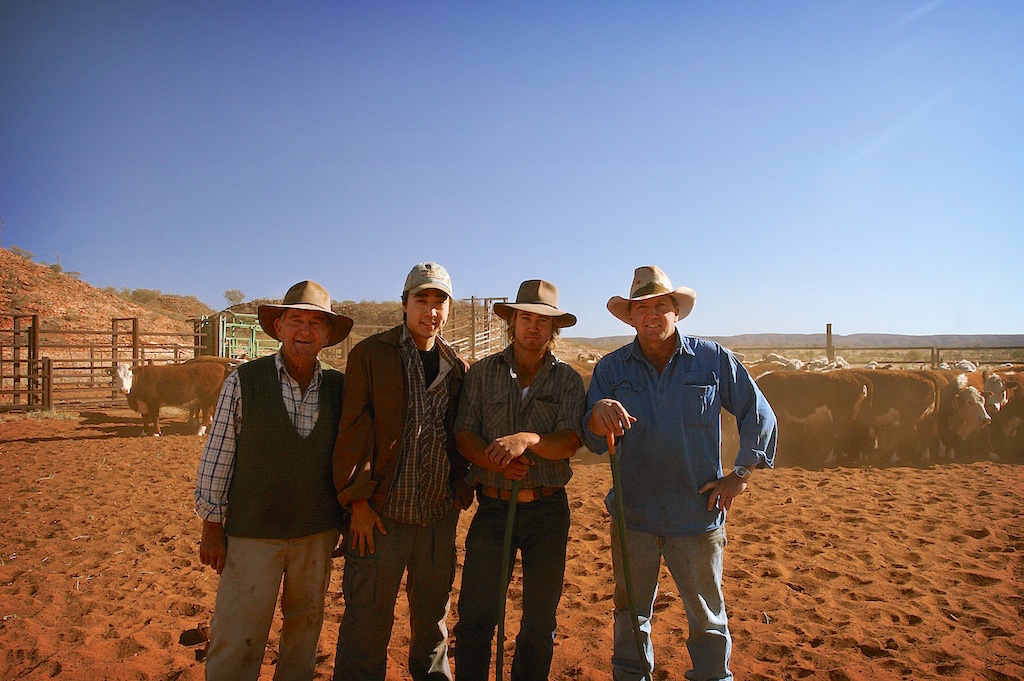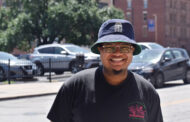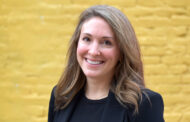Editor’s note: This content was sponsored by the Ewing Marion Kauffman Foundation but independently produced by Startland News.
Acting in a Bollywood film. Pie making on Armenian television. Cooking on a dude ranch in Australia. Sewing in a dress factory in Bangkok. Farming maize in Zambia.
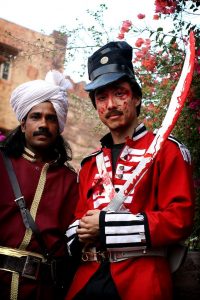
Stoll acting in the Bollywood film “Veer.”
Each revealed a lesson and mission for Andy Stoll.
“The one great way to help people is helping them participate in the global economy,” said Stoll, the program officer for ecosystem development at the Ewing Marion Kauffman Foundation. “For me, the answer is entrepreneurship. In an age where entrepreneurship has been democratized, how do we create the systems that support them?”
At 26, Stoll quit his job, sold his possessions and bought a one-way ticket for a four-year, open-ended journey. On the adventure, Stoll weaved through 40 countries, working a variety of odd jobs to soak in as much about how people worked and lived as he could.
Along the way, he explored social entrepreneurship as a field, analyzing problems that could be solved on a grander scale. From Korea and Zambia to Hong Kong and Colombia, Stoll encountered communities with a variety of strengths and weakness. One requirement for an area’s ability to propagate entrepreneurship remained constant.
“It takes a village to raise an entrepreneur and it takes all types of people to be in that village,” he said. “We all need to do more work to integrate our city across all the different spectrums of diversity and to make sure that connection and trust are a key element of the city.”
The global expedition about 10 years ago proved to be an in-depth and personal study that informs Stoll’s current work at the Kauffman Foundation. He now helps lead the foundation’s efforts to reinvent traditional models of economic development, focusing instead on how to cultivate inclusive entrepreneurial ecosystems.
Prior to joining the Kauffman Foundation, Stoll co-founded six entrepreneurial-focused organizations, including the Startup Champions Network, the nation’s first professional group for full-time innovation ecosystem builders. He also helped lead the foundation’s inaugural ESHIP Summit, which drew more than 400 entrepreneurial ecosystem builders from across the nation.
Thanks to his travels and community building efforts, Stoll said, he is confident entrepreneurial communities can thrive throughout the world.
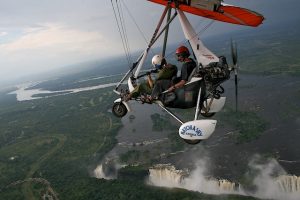
Stoll flying above Zambia
“Geography doesn’t have a monopoly on good ideas,” Stoll said. “Not all the smart people live in Silicon Valley. People all over the world from Malawi to Kazakhstan to Kansas City have great ideas. … I deeply believe that you can build an entrepreneurial ecosystem anywhere. But they all require a unique approach or require a unique set of things that you really do need a person, an ecosystem builder to really tend to it.”
Startland News recently sat down with Stoll in the Kauffman Foundation’s dining hall to talk about his background, travel stories and what he’s working on now.
What’s a lesson from your travels that Kansas City can learn from?
I think a lot of towns in the Midwest, and communities in the Midwest where I’m from, our humbleness sometimes holds us back. Things are pretty good, but to really jump up in this new era and really accelerate, we just have to think bigger. We have to take bigger swings, take bigger actions. Take on huge and intractable challenges.
How do you remain optimistic in the face of obstacles and reluctance to change traditional models of economic development?
I think the resiliency is driven by excitement. There isn’t a new emerging model of economic development that is coming forth. Because of the exponential growth in technological connectivity, the economy of the entire world is changing. What we’re trying to do is help people understand and maybe explain the phenomenon and then empower individuals to act within it. … It’s going to take rethinking everything. Rethinking our education systems. Rethinking how we help entrepreneurs. Rethinking how we deal with diversity and inclusion.
How are Kansas City’s prospects to capitalize on these changes?
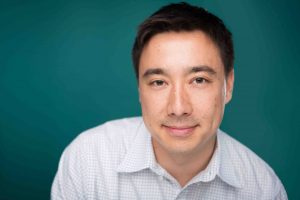
Stoll
Kansas City is so well positioned to be a leader and it already is a leader in thinking about that stuff. Whether that’s education, inclusion, smart cities or public transportation. What a cool time to be alive. Everything is shifting and the friction and the pain and the fear and anxiety we have is just because we’re literally shifting economic epics. We were hunter-gatherers, then we moved to farms and we were agrarian, then we shifted into cities and the industrial age. Now we’re literally shifting into this new age that we don’t even have a name for. At the Kauffman Foundation, our goal is to help communities better understand what they can do to ride that shift and to really empower the makers, the doers and the dreamers to take advantage of that as well.
How has that process been going at the Kauffman Foundation?
We don’t have all the answers. This is an emerging field and what we’re going to try to do is provide the rails and some guidance as to where we think the field is going. But what it really takes is people engaging in ecosystem building and entrepreneurship and helping us learn from that experience, sharing their story, sharing what’s working and sharing what isn’t working, because that is sometimes more helpful. We’re very much taking the viewpoint that the answers aren’t inside the Kauffman Foundation. The answers are out there and we’re just trying to gather it together.
What do you do for fun?
My creative output is actually cooking. In another life, I would be a food entrepreneur of some nature. I worked as a baker in college. I worked as an executive chef and executive dishwasher in the outback of Australia at a sort of luxury dude ranch. It is my creative outlet. You can’t cook something and think about something else or you screw it up. Especially when I’m stressed, you’ll find me in the kitchen making pies or something.
What’s your signature dish?
My Japanese-American farmer’s wife grandmother from rural Nebraska, taught me how to make apple pies from scratch, including the crust, when I was 16. That has become my signature thing. I have cooked that in 30 countries around the world, including on Armenian national television.
On Armenian national television?
It was hilarious and awesome. It was a program about how Americans celebrate Thanksgiving. Through a series of serendipitous connections, I ended up teaching pie making on Armenian national television.
What was the reaction?
Well, I might be famous in Armenia. I have not been back since. As an aside, a funny story is that I did that show in Armenia in 2007. In 2010, my friend from Los Angeles texted me and he was like “Did I just see you making apple pie on Russian television?” They were still rotating the broadcast because there are a lot of Armenians in L.A. I was like, “Well, it was actually in Armenia, but yes I was.”
What does the next year at the foundation look like for you?
I’ve been here a little short of a year. A lot of that has been just listening to ecosystem builders and entrepreneurs and you’re beginning to see us put up of some of the tent poles around the program. The first component is the ESHIP summit, which is an annual gathering of ecosystem builders from around the country and the world. The second component is the very beginnings of a knowledge base on how to do ecosystem building. That’s the Kauffman Playbook.
The Kauffman Playbook is incomplete and in very much draft form. We are taking a swing in explaining some of this. That all leads to the third component of the work, which is how do we begin applying some of what we’re learning, some of the models and some of the strategies in Kansas City and other communities and really begin to use Kauffman’s strength and research to really try to rigorously prove out what works and then show that to the world.



